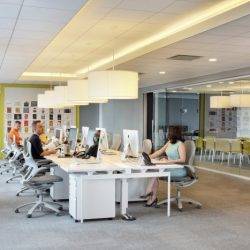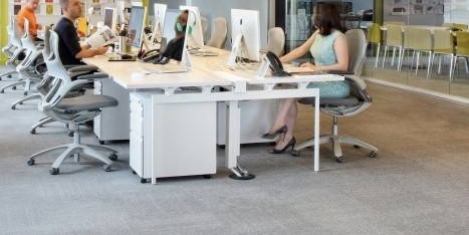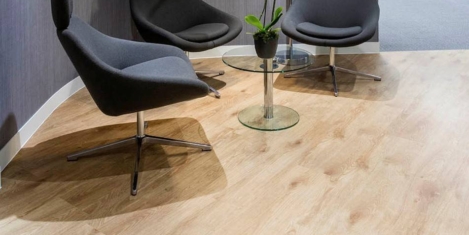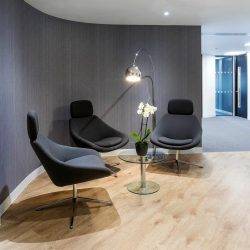March 6, 2017
US employers turn to perks and office design to increase employee retention 0
 Younger workers are less and less loyal to employers, which is driving firms to place greater emphasis on benefits, empowerment and a better working environment, according to a study from ReportLinker. The small scale online study of 500 people found that Millennials are less likely than older generations to say they’re highly committed to their employer, with just 40 percent saying they somewhat agree with this statement compared to 66 percent of older workers say they’re highly committed to their organisation. The report concludes that this is encouraging employers to introduce new ways of winning the loyalty of employees. For example, 87 percent of employees who are more involved in decision-making are also more likely to say they are committed to their employers although, as always, we should be wary of the distinction between correlation and causation.
Younger workers are less and less loyal to employers, which is driving firms to place greater emphasis on benefits, empowerment and a better working environment, according to a study from ReportLinker. The small scale online study of 500 people found that Millennials are less likely than older generations to say they’re highly committed to their employer, with just 40 percent saying they somewhat agree with this statement compared to 66 percent of older workers say they’re highly committed to their organisation. The report concludes that this is encouraging employers to introduce new ways of winning the loyalty of employees. For example, 87 percent of employees who are more involved in decision-making are also more likely to say they are committed to their employers although, as always, we should be wary of the distinction between correlation and causation.









 The average amount of overtime workers put in equates to around 68 working days a year and the fact that only one third are paid for this means the majority of people are essentially working for free until the 9th of March each year, claims a new study. The research by TotallyMoney.com with OnePoll, which looked into overtime in the UK in 2017 found that unsurprisingly 60 percent of British workers say they don’t have a good work-life balance. Common reasons given for working overtime were pressures from colleague and excessive workloads; with almost 65 percent of people surveyed not being paid for overtime worked. Only a third of British workers say they typically leave work on time; which ties in with recent TUC analysis which revealed that the number of employees working longer hours grew by 15 percent over the last five years. Working longer hours, warns the union, not only has negative impacts on health, but can actually lead to workers being less productive.
The average amount of overtime workers put in equates to around 68 working days a year and the fact that only one third are paid for this means the majority of people are essentially working for free until the 9th of March each year, claims a new study. The research by TotallyMoney.com with OnePoll, which looked into overtime in the UK in 2017 found that unsurprisingly 60 percent of British workers say they don’t have a good work-life balance. Common reasons given for working overtime were pressures from colleague and excessive workloads; with almost 65 percent of people surveyed not being paid for overtime worked. Only a third of British workers say they typically leave work on time; which ties in with recent TUC analysis which revealed that the number of employees working longer hours grew by 15 percent over the last five years. Working longer hours, warns the union, not only has negative impacts on health, but can actually lead to workers being less productive.








 The
The 
 The majority (79 percent) of workers say reliable and modern technology is more important to them than office aesthetics, while accessories such as ping pong tables, slides, hammocks and wacky office designs may look good in pictures, but they don’t necessarily make employees any happier or productive. The is according to a survey, conducted by storage firm Kiwi Movers, which found that 86 percent of UK adults who work in an office said fun features were of no specific value to their working life, 11 percent said they were nice-to-have and of some value and 3 percent said they were very valuable. The most popular office perks are those offer an immediate tangible benefit to the employee, but even so, as many as 23 percent don’t take advantage every day; while 71 percent overall said they’d like more space in their office and of those, 58 percent believe that could be achieved by removing non-essential items. The research also found that younger workers were more likely on average to take advantage of ‘environmental’ perks like chill out areas and recreational equipment.
The majority (79 percent) of workers say reliable and modern technology is more important to them than office aesthetics, while accessories such as ping pong tables, slides, hammocks and wacky office designs may look good in pictures, but they don’t necessarily make employees any happier or productive. The is according to a survey, conducted by storage firm Kiwi Movers, which found that 86 percent of UK adults who work in an office said fun features were of no specific value to their working life, 11 percent said they were nice-to-have and of some value and 3 percent said they were very valuable. The most popular office perks are those offer an immediate tangible benefit to the employee, but even so, as many as 23 percent don’t take advantage every day; while 71 percent overall said they’d like more space in their office and of those, 58 percent believe that could be achieved by removing non-essential items. The research also found that younger workers were more likely on average to take advantage of ‘environmental’ perks like chill out areas and recreational equipment.










February 28, 2017
A report into facilities management that is hard to swallow 0
by Simon Heath • Comment, Facilities management
(more…)